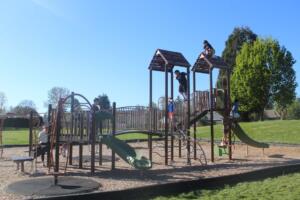After receiving four bids for the Northwest Sixth Avenue roundabout project that significantly exceeded the engineer’s estimate, the Camas City Council voted to award the contract to McDonald Excavating, Inc., of Washougal.
The $2.037 million contract includes construction of a one-lane roundabout at Northwest Sixth Avenue and Norwood Street, along with two additives that included asphalt drive lanes (instead of concrete), as well as an optional package that consisted of decorative street light poles, a sidewalk to Forest Home Park at Logan Street, and the relocation of currently existing banner poles.
The original engineer’s estimate for the base bid with the two additives was $1.761 million.
According to Public Works Director Steve Wall, contractors in the area are not currently lacking for work. It’s a situation that is creating a challenging bidding climate.
“The market conditions are still pretty hot, which has had an impact on bidding of projects,” he said during the April 4 City Council meeting. “We actually had a contractor that let us know they were not going to submit a bid just because of how busy they are. That is a sign of the conditions, certainly.”



